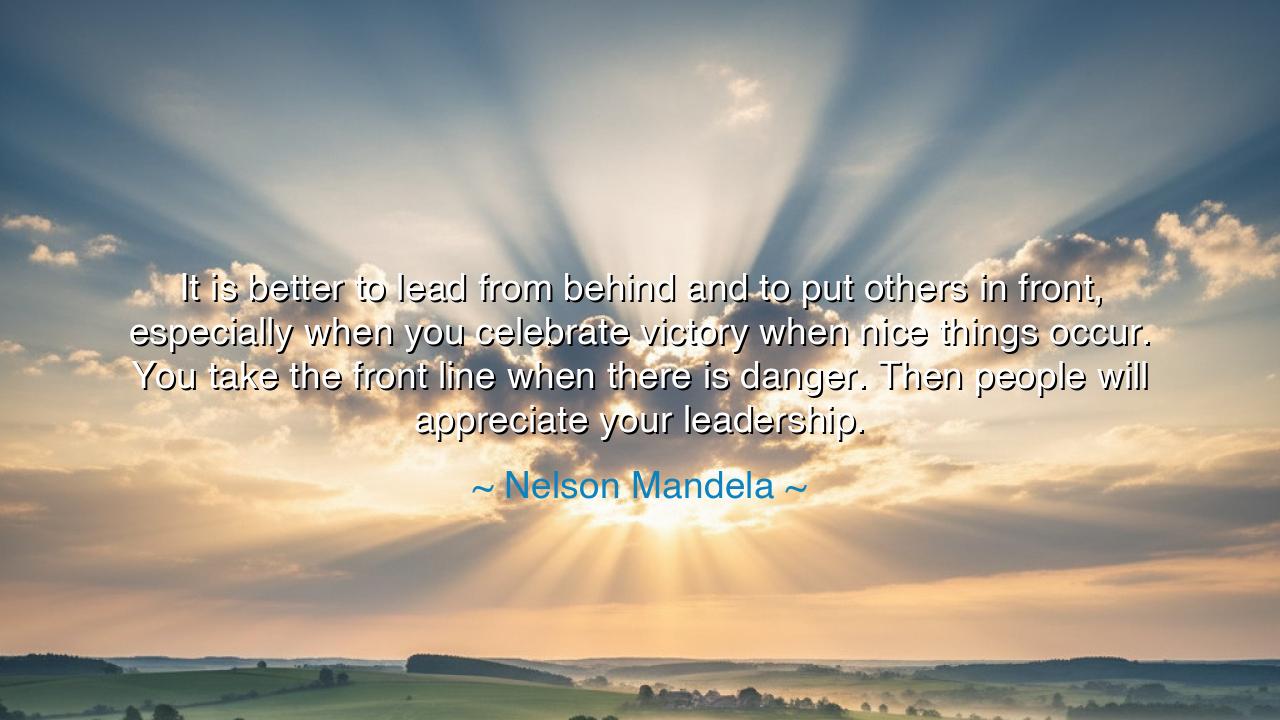
It is better to lead from behind and to put others in front
It is better to lead from behind and to put others in front, especially when you celebrate victory when nice things occur. You take the front line when there is danger. Then people will appreciate your leadership.






The words of Nelson Mandela, “It is better to lead from behind and to put others in front, especially when you celebrate victory when nice things occur. You take the front line when there is danger. Then people will appreciate your leadership,” carry the weight of one who bore chains for decades and yet emerged to guide his nation with humility and wisdom. In them lies the eternal law of true leadership: that the leader exists not for himself, but for the people he serves. To lead from behind is to elevate others, to give them credit in times of joy. To lead from the front is to bear the burden of risk, to shield them in times of peril. In this balance of humility and courage lies the heart of greatness.
The ancients themselves honored this principle. The shepherd does not walk always before his flock; sometimes he guides from behind, letting the sheep move freely while ensuring none are lost. In battle, the noble king stands at the front, facing the storm of arrows so his soldiers know he shares their danger. Mandela gives modern words to this ancient truth: the leader who claims glory for himself breeds resentment, but the leader who gives glory to others wins loyalty that endures beyond death.
Mandela’s own life embodied this teaching. After twenty-seven years in prison, he could have emerged bitter, demanding recognition, placing himself always in the spotlight. Instead, he placed others at the center—his people, his colleagues, even his former enemies. When South Africa celebrated freedom, he gave credit to the movement, to the ordinary men and women who resisted injustice, to the unity of a nation. Yet when there was risk of violence, division, or bloodshed, Mandela stood in front, placing himself as a shield. His leadership was cherished not because he exalted himself, but because he bore the heaviest burdens and shared the lightest rewards.
History offers other examples of this truth. George Washington, after the victory of the American Revolution, might have crowned himself king. Instead, he stepped aside, giving credit to his soldiers and surrendering power to the people. But when the battlefield roared, he rode at the front, facing musket fire and cannon, showing his men that he would risk what he asked of them. By stepping forward in danger and stepping back in triumph, he secured a legacy of respect that endures across centuries.
The meaning of Mandela’s words is both profound and practical. Profound, because they reveal that leadership is not domination but service. Practical, because they show how to earn the deepest loyalty of others. If you shield your people from blame and danger, but share with them the glory of success, they will follow you with gratitude and love. If, however, you hoard victories and abandon them in hardship, they may obey for a season, but their hearts will never be yours.
The lesson for us is clear: in our homes, in our work, in our communities, we must learn to lead from behind when honor is being given, and lead from the front when difficulty strikes. Protect others from the storm, but let them enjoy the sunshine. In this way, you will create trust so strong that when you call, they will answer, not out of fear, but out of devotion.
The practical action is this: when success comes, name others first, give credit generously, and remain humble. When hardship comes, do not shrink back or cast blame; take responsibility, stand in the breach, and show that your courage is real. In this way, you will embody leadership that is selfless, and in turn, you will inspire others to rise into their own greatness.
Therefore, O listener, engrave upon your heart Mandela’s wisdom: “Lead from behind in victory; lead from the front in danger.” For in this balance of humility and courage lies the secret of enduring leadership—the kind that does not merely command obedience, but awakens love, trust, and eternal respect.






AAdministratorAdministrator
Welcome, honored guests. Please leave a comment, we will respond soon